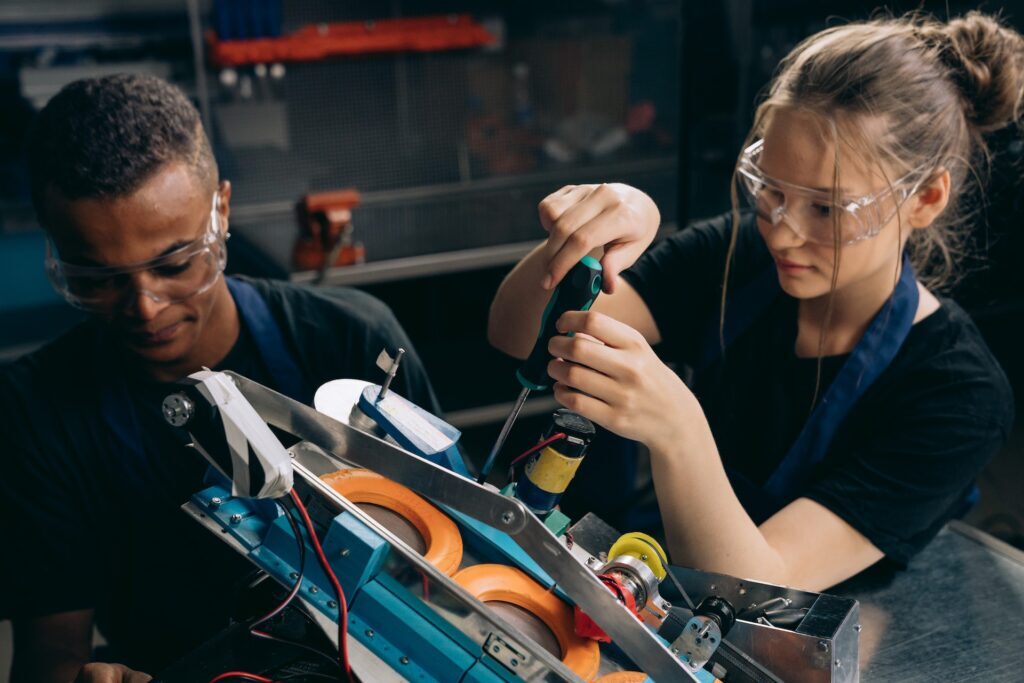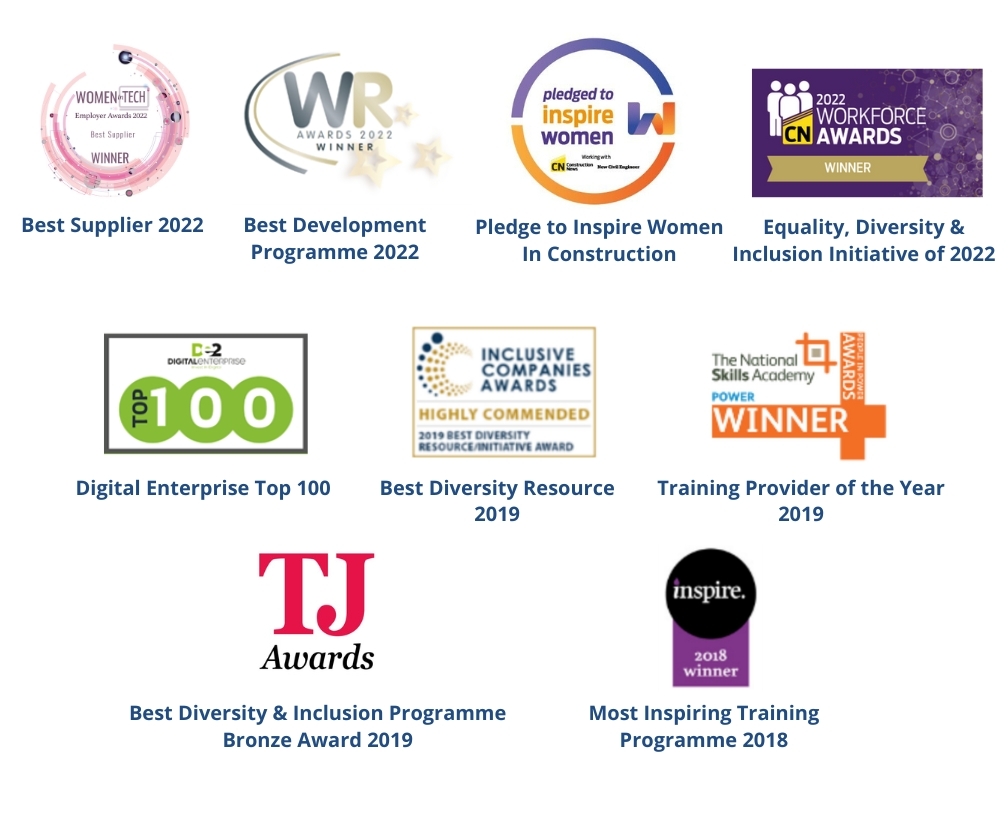One of the persistent challenges facing the tech industry is the lack of diversity and representation, particularly when it comes to women from underrepresented ethnic groups and those with disabilities.
For technology businesses looking to work on and overcome this issue to build a more inclusive and equitable industry, it is essential for change to start at the foundation of the business. It is critical that decision-makers take proactive steps to attract and support women from diverse backgrounds, creating a culture which enables them to thrive.
At the beginning of 2022, government-funded growth network Tech Nation, revealed that nearly three million people, or 9% of the UK workforce, are employed in the UK tech industry. Out of this group, just 26% of those in the tech workforce are women.
An alarm bell should be ringing for all tech leaders, research revealed that women are often driven out of the tech sector, often due to; burnout, gendered biases, toxic workplace culture and lack of work-life balance. The tech workforce more broadly is made up of 81% men, and 19% women – meaning that tech leadership has better gender balance than those working in tech.
Leadership data revealed that just 9% of C-Suite leaders in tech companies are held by women. Furthermore 3% of Chief Technology Officers or Technical Director tools are held by women, and just 0.6% and 0.4% of Chief Operating Officers and Chief Financial officers, respectively, are occupied by women. The reason for this may be that company boards are more visible than the employees at the company, meaning some decisions may be underpinned by the desire to gain positive PR.
However, companies need to do more than virtual signalling to make an impactful difference.
While on the topic, it’s important to also highlight that the gender pay gap in tech remains one of the largest. UK Tech revealed in March 2023 that tech startups in the UK are paying women 26% less than their male counterparts, the highest unadjusted gender pay gap in Europe. These new figures, which were published on International Women’s Day 2023, show that women working in the UK tech industry are on average paid 74p for every £1 earned by men.

There are a range of key strategies that can be implemented to attract more women from underrepresented ethnic groups and those with disabilities, which span from business-wide transformation to removing the possibility of unconscious bias during the hiring process.
In order to create a truly inclusive culture, it is important to encourage diversity at all levels of the organisation. This means actively seeking out women from underrepresented ethnic groups and those with disabilities for leadership and management roles, as well as ensuring that diverse perspectives are represented on project teams and in decision-making processes.
Our EMPOWER and THRIVE programmes level the playing field for diverse talent ensuring a more diverse leadership and management pipeline.
It’s time to shake up the hiring strategy and in order to attract a diverse pool of candidates, tech businesses should consider expanding their recruitment efforts beyond traditional channels. This can include partnering with community organisations, attending job fairs and conferences that cater to underrepresented groups, and promoting job openings through diverse media channels.
Blind hiring involves removing personal identifying information such as name, age, and gender from resumes and job applications. This can help reduce unconscious bias in the hiring process and create a more level playing field for all candidates. Many recruiters choose to assign each candidate a number making this management system much clearer and unbiased.
Transformation needs to begin at the top, and unconscious bias training can help managers and employees become more aware of their own biases.
Whether it’s c-suite or board members, or those on the frontline looking after customers, unconscious bias training, for those working in tech, can help develop strategies to overcome them. This can help create a more inclusive workplace culture where all employees feel valued and respected and give people the tools to navigate situations more sensitively. Learn more about our Unconscious Bias Training.
Implementing a diverse interview panel can help reduce bias. This is done through a range of individuals conducting or feeding into interviews, ensuring that everyone is evaluated fairly. This also helps to create a more unified workforce.
Setting goals and tracking progress can help ensure that the company is making progress towards creating a more diverse and inclusive workplace. Goals such as increasing the number of women and underrepresented groups in leadership positions, can then be aligned with a strategy that sets out a clear structure and support system for how this can be achieved.
Creating an inclusive culture where all employees feel valued and respected is essential to retaining a diverse workforce. There are numerous approaches which can include offering employee resource groups, promoting diversity and inclusion in company communications, and offering training on cultural awareness. Learn more about our ‘Moving The Dial’ workplace culture survey.
Professional development shouldn’t be an obstacle course, and easy access to tools, training and leadership programs should be a pillar of your business. Not only does this display an open and honest approach to supporting the professional growth of all employees, it reduces the risk of gatekeeping of information by managers.

Women from underrepresented demographic segments may face unique challenges when it comes to navigating the tech industry. Mentorship programmes enable women in your business to develop skills, connections and knowledge across a range of work streams, in order to diversify their skills and help them grow in the industry.
We all benefit from someone to lean on who can offer guidance and support based on their own experiences within the industry and help others navigate their career. Providing advice on how to overcome challenges and make progress towards their goals can help to give employees a new view on their approach to work. They can also help women identify opportunities for professional growth and development.
Many women in tech face imposter syndrome and struggle with self-doubt. By providing a supportive mentorship and networking environment, women can build confidence in their abilities and gain the courage to take on new challenges. Learn more about imposter syndrome and how to overcome it.
Networking is a critical component of career advancement. Mentorship and support networks can provide opportunities for women in tech to connect with other professionals in their field, share knowledge and expertise, and build relationships that can lead to new opportunities.
Easy access to resources can support the potential of women in the tech industry, reducing barriers to initial entry and enabling more opportunities to grow knowledge and diversify skill sets. Mentorship programmes can also facilitate access to more resources through direct access to a support network, personalised recommendations based on the individual’s requirements and access to development opportunities and financial resources.
Working in tech, particularly being a male dominated industry, a sense of community can help your employees feel more included. Mentorship and support networks can help women in tech feel like they are part of a community. This sense of belonging can be empowering and provide a source of motivation and support as they work towards their career goals.

Women from diverse backgrounds may face additional barriers when it comes to balancing work and personal responsibilities. Our Return to Work Programme can help with this. offering flexible working to remove barriers such as lack of childcare or finances.
Flexible work arrangements, such as telecommuting, flexible hours, and job-sharing opportunities can enable companies to make it easier for women to pursue their careers while also meeting their other obligations.
Many women in tech juggle work and family responsibilities, which can make it difficult to pursue career advancement opportunities, from lack of maternity support packages to long hours, the tech industry can appear ruthless to many people with further additional responsibilities.
Flexible work arrangements, such as remote work, part-time schedules, and job sharing, can help women balance work and family obligations and pursue career opportunities without sacrificing their personal lives.
In addition, reviewing the paternity packages offered can help support women beyond your business by offering partners of pregnant people more flexibility and leave.
Offering flexible work arrangements can enable women who may not otherwise have the opportunity to participate in the tech industry to do so. This can include women who live in remote areas, those with caregiving responsibilities, and those with disabilities. This reduces commuting times, flexibility means that strict 9-5 doesn’t need to be an issue which is useful for childcare or schooling and those with long term illness or living with a disability can structure their workday to their wellbeing.
Offering flexible work arrangements can promote diversity and inclusion by creating a more inclusive workplace culture that supports employees from diverse backgrounds and with different needs. This can help attract and retain a diverse workforce, which can drive innovation and growth. One of the best ways to do this is to encourage sharing and improve education around different cultures, in order to reduce misinformation.
Research has shown that employees who have access to flexible work arrangements are more satisfied with their jobs and are more likely to stay with their employers. This can help tech companies retain top talent and reduce the costs associated with turnover.
Offering flexible work arrangements can increase productivity by allowing employees to work when they are most productive and focused. This can lead to better outcomes for the company and for individual employees.

To better facilitate opportunities for women from underrepresented ethnic groups and those with disabilities to enter into the tech industry, it is important to reach out to these communities early on.
One way to do this is through partnering with schools and community organisations. Within organised sessions, companies can introduce young women to tech careers and provide them with the resources they need to pursue these careers. This can include offering internships, sponsoring tech programs and workshops, and providing scholarships and other financial support.
Tech companies form collaborations with schools to offer educational programs and workshops. The aim of these programs is to introduce students to the tech industry. Through a partnership with schools, tech companies can inspire and encourage students, particularly girls and underrepresented groups, to pursue careers in tech.
Tech companies should consider offering internships and apprenticeships to students. With a focus on engaging with those who do not have access to these opportunities from less advantaged backgrounds, this can provide students with hands-on experience and a pathway to a career in tech.
Tech companies can offer mentorship and support to students, particularly those from underrepresented backgrounds. This can help them navigate the challenges of entering the tech industry and provide them with guidance and support as they pursue their careers.
Further partnerships with community organisations, such as women’s organisations, community centres, and local charities, mean businesses can offer programs and initiatives that support women’s careers. This can include childcare services, support groups, and educational programs.
Flexible work arrangements should now be a given following the adaptability of the tech workforce during the COVID-19 pandemic. Remote work and flexible schedules are a simple but effective way to support women’s careers. This can help them balance work and family responsibilities and enable them to pursue career opportunities without sacrificing their personal lives.

Unconscious bias can be a major obstacle to attracting and retaining women from diverse backgrounds, particularly within the tech industry, with its historical identity rooted in being somewhat of a ‘boys club’. To overcome this issue, companies can provide training and education on unconscious bias, as well as establishing diversity and inclusion policies and practices. It should also be best practice to regularly review and assess progress in creating a more equitable and inclusive workplace.
Does your company offer training programs for their employees to raise awareness of unconscious bias and provide strategies to mitigate it? Unconscious bias training can include workshops, seminars, and online resources that teach employees about the impact of bias on decision-making processes and how to recognise and challenge it.
As previously discussed, blind hiring practices can reduce the likelihood of unconscious bias in the hiring process and provide equal opportunities for all candidates.
Utilising your in house talent for data, this can then use data to identify areas of bias in the hiring, promotion, and retention processes. By analysing data on employee demographics and career paths, companies can identify areas where bias may be present and take steps to address them. Skills 4 offers an innovative Moving the Dial Report as part of our development packages providing valuable data on organisational culture.
Tech companies can encourage diverse hiring panels, including employees from diverse backgrounds and with different experiences, to be part of the hiring process. This can provide different perspectives and reduce the likelihood of unconscious bias in the decision-making process.
Promotion of an inclusive culture by valuing and celebrating diversity and providing opportunities for all employees to contribute and succeed, can help break down preconceived notions, ideas or bias. This can include mentoring and coaching programs, employee resource groups, and leadership development programs that provide equal opportunities for all employees.
The technology industry has a lot to learn in order to create broader availability to tools, resources and employment, for women and in particular, those from underrepresented ethnic groups or those with disabilities. By tapping into the talents, skills, and perspectives of these individuals, the industry can drive innovation, creativity, and growth while also improving social equity and inclusion.
